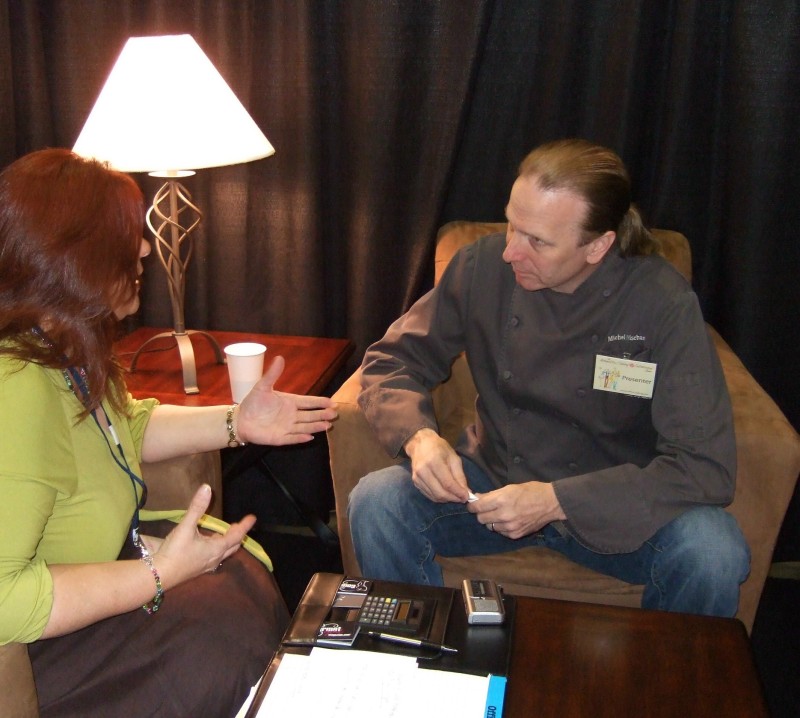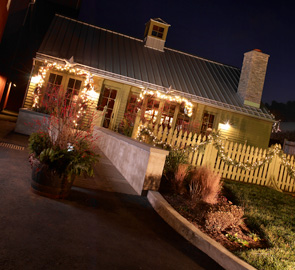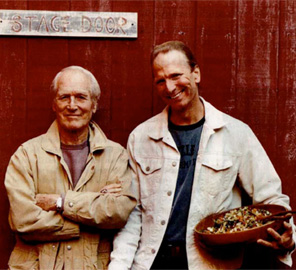 This interview was done on September 13, 2008, only weeks prior to when Michel's partner and friend, Paul Newman, passed away. All references to Paul were made at that time. Paul Newman passed Friday, September 26, 2008. Please join us in supporting Paul’s legacy through volunteer work or by supporting the cause that warmed his heart the most:
This interview was done on September 13, 2008, only weeks prior to when Michel's partner and friend, Paul Newman, passed away. All references to Paul were made at that time. Paul Newman passed Friday, September 26, 2008. Please join us in supporting Paul’s legacy through volunteer work or by supporting the cause that warmed his heart the most:
Hole in the Wall Camps, 265 Church St., Ste. 503, New Haven, CT 06510, www.holeinthewallcamps.org.
Lou & Elaine
Michel Nischan, The Dressing Room, Westport, CT
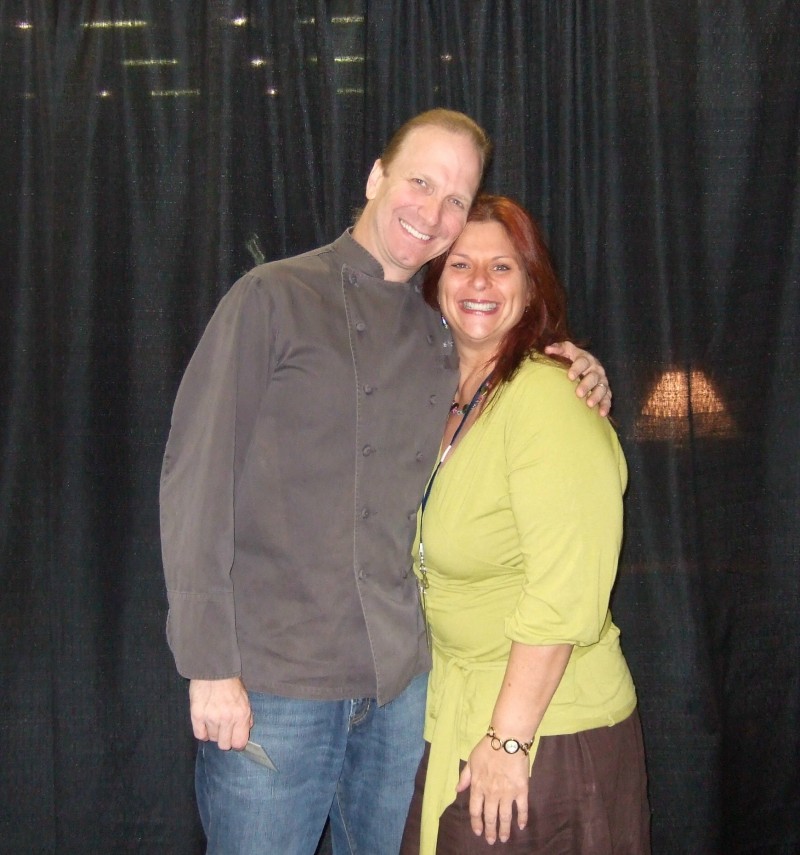
Growing up on a farm instilled in Michel Nischan a deep appreciation for sustainable agriculture and those who work the land has never left him. Nischan is Chef/Owner of Dressing Room: A Homegrown Restaurant, located on the grounds of the Westport Country Playhouse, and President of Wholesome Wave Foundation Charitable Ventures, a non-profit organization focused on making locally grown, organic and sustainable foods available to all. This starts a new chapter in his ongoing story about the love of food and the people who produce it.
Elaine with Michel
Nischan, a renowned chef and best-selling author, came to know Paul Newman’s daughter, Nell Newman, through his advocacy for a more healthful, organic and sustainable food future. Nell, the driving force behind Newman’s Own Organics®, introduced Michel to Mr. Newman when she learned of her father’s plans to become involved in a restaurant. Paul and Michel found their beliefs on food, family and community to be remarkably aligned, and The Dressing Room evolved as the place where their shared values could have a common home and expression.
Michel is credited with creating a cuisine of well-being, focused on a respect for pure, local, organic ingredients and their intense flavors – without the use of highly processed, overly indulgent ingredients. The inspiration to explore cooking for well-being came in 1994 when his five-year-old son Chris was diagnosed with juvenile diabetes. “Chris’s illness made me realize that floating on foie gras, bathing in cream, and dusting in processed flour might not be in my customers’ best interest,” says Michel. He introduced his groundbreaking new cuisine at Heartbeat restaurant at the W Hotel, midtown Manhattan in 1997, and was immediately propelled to the forefront of New York's culinary scene.
Since then, he has continued to raise the bar for delicious and healthful cooking and is continually lauded for his dedication to organics, sustainability and cultural food preservation. After years of focusing on healthful, sustainable and culturally significant cooking causes, Michel decided to put his methods in action and print by writing two well-received cookbooks, Homegrown Pure and Simple: Great Healthy Food from Garden to Table (Chronicle Books, 2005) and Taste Pure and Simple: Irresistible Recipes for Good Food and Good Health (Chronicle Books, 2003). Taste was listed as a bestseller in The New York Times and The Wall Street Journal, and won a 2004 James Beard Foundation Cookbook Award. Michel resides in Fairfield, Connecticut, with his wife, Lori, and their five children.
He has welcomed us time and again as if family, and we are pleased to call him friend. It is our pleasure to bring you Up Close and Personal with chef, Michel Nischan.
The Interview
Elaine: The passions you shared with us in Atlanta, not just your cooking, but also your other endeavors made us realize that we had to sit down with you and spend more time discussing them. This is our opportunity to share with our readers your love of cooking, but also your desire to help bring healthy food to those segments of the population that need it the most. Michel Nischan: Opening a restaurant in the suburbs and to find skilled help is always a little bit of a challenge to begin with. You’re competing with the nearby metropolitan area. Their culture. For instance, if I were a young 28 year old cook trying to build my career, I can get a job at Jean Georges, get off of work at midnight, go to Nobu next door, or go to an Ethiopian restaurant and feed my culinary curiosity. Whereas in Westport, I enjoy working at The Dressing Room, but once I get off work there’s no place to go! Our streets roll up in Fairfield County. It’s a culture that we compete with. Then you add what we are doing with organic sustainability. A lot of people think there is a tremendous interest in that and there is, but the work is more difficult than the work in an upscale restaurant. Protocols are stricter, there is more to the preparation. One day you are working with heirloom tomatoes, you think you’re going to be working with them for awhile. The temperature drops, you get a cold night... Elaine: And they’re gone for the rest of the year. Michel: Yes, now you have to scramble to change the menu. You have to remove all the menu items where you used them and/or find substitutions. Perhaps you have to find 3 more ingredients because of the variety of dishes you were using them in. Meat, salad, fish. That’s hard on chefs. Elaine: How do you feel about that challenge? Michel: I love it. It’s what cooking should be about. For management, it’s especially difficult. The business is hard enough as it is. You work a 70 hour work week in a restaurant that buys from conventional purveyors. I work a lot more than that because I do more than just the restaurant. Elaine: Typically a chef picks up the phone and orders from a mid-size or large scale food service company and places their order, one call, done. Michel: Correct, when you are buying from local producers, you’re making 12-15 calls and then 15-30 follow up calls. A farmer doesn’t always pick up his phone, doesn’t always have cell phone reception or a message machine. Elaine: They don’t have that corporate infrastructure. Michel: You really have to work hard to do what we do here. There are a lot of restaurants that say they do it, but in reality, they do it on a limited basis, but they splash it all over their menu. There is this perception that a lot of restaurants and people are doing organic. Aberrationally, it’s not fully true. Alice Waters has worked very hard to be successful over the 30 years she’s been doing this. Peter Hoffman, Greg Higgins, Rick Bailiff, these are chefs that have given up large parts of their life to do the right thing. They have a conscience, a passion, a conviction or a belief in getting America back to what it once used to be, with respect to fresh food and healthy eating. I share that from the heart. Elaine: It is a very serious commitment. Michel: No question about it. Not everybody is ready to do that. They’re watching Top Chef. Elaine: They want the fast track to the big time. Michel: There’s a little bit of that too! We’re at a point now where we’ve found the people that we need to move forward. Elaine: You’ve also found your niche. When researching anything ‘organic’ your name invariably comes up. Paul Newman and Michel Nischan, well known names, separately and together. Michel: What we have is you guys, as the enlightened media, and our customers as consumers. Lou: From a layman’s point of view I would think that would encourage someone to join the ranks. What you’re saying sounds almost like the opposite. Michel: What we are doing is very appealing in the culinary world, when you look at culinary grads like those from Johnson & Wales. There are young people who are very devoted to and interested in the values that we represent here. Like us in the greater restaurant world, these people are in a very small minority, when you think of the restaurants that really do it right. If they follow the organic sustainable principle, we are probably less than 1% of all restaurants in the country. White tablecloth restaurants probably represent 5-8% of all restaurants and we are probably 10% of that. Lou: Where do you see yourself in 5 years? Michel: I hope we get to 25 or 30% of white tablecloth restaurants. Clearly I do see it going that way. Especially consumers who can afford to spend $30-$60 for dinner per person, they feel they want to have more control about what they are spending their money on. They feel if they are spending that now, they are willing to spend a little more, $40-$70 or $80, to know they are eating in a restaurant they feel comfortable and confident about with regard to what they are eating. Elaine: Including the total effect it has on their health. Michel: Absolutely. It’s their health and also the environmental health, the social issues that surround it. I consider myself an American. I try to be as non-partisan as I can. Neither side of ‘the aisle’ has really been great about supporting what I’m or my colleagues talk about. But food is a social issue because it’s something that people have to do to live. You don’t need a car or designer clothes to live. Arguably, you don’t absolutely have to have electricity or heat to live, you can find shelter. You go without food, and water, and you die. It’s that simple. Elaine: Let’s talk about the social responsibility, which I know you are very committed to. Michel: When you come to any society where there is a government, a populace, it really is the job of the overall community to see that every resident has access to wholesome food. I really believe that it is a basic human right. Vibrant societies know that. Prior to globalization there were people who were poor but not hungry, that is not the case today.
Michel: It’s exciting to see how well it’s going. We’ve launched in several locations including Holyoke (MA). Boston is hesitating because they are afraid they’re going to be inundated and will run out of money. They’re being very careful about opening it up to the press. It is word of mouth. Elaine: There is such a tremendous need and they are so densely populated I can understand them taking it slow. Michel: Holyoke, I love to celebrate that one. There is a great organization there that we partner with. We went in with a grant and they set up this great relationship with the YMCA, the Health Center, Health and Social Services, all the youth groups and grade schools. They have this great community network and got the word out. (Michel has this broad grin on his face as he is recalling the scene he witnessed.) We went to launch at the Holyoke Farmers Market and 100-150 people showed up! Seniors with food stamps, coupons and their double value coupons, because of how organized they were. They really bought the market down and for the first time ever, vendors/farmers had to close early because they ran out of product. Elaine: How wonderful for you to witness the realization of your hard work and dreams, congratulations!
Our program enables the bearer to double the value of their food stamps and coupons. They had been able to purchase vegetables before, but this program allows them to buy fruit and other products available at the market. Organizations typically report back the number of people they serve in a day. The food meets the lips. I have to share one scene with you that deeply touched me. A young couple, must have been in their 20s. She’s chasing him around saying, "Here try this." He’s like, "Get this thing away from my mouth." She’s saying, "But we can afford it! Try it, it’s good." Elaine: What a feeling to watch all of that unfolding before you. In some cases you have opened a new world to them. Eventually, when they no longer require assistance, they will hopefully continue to support those markets. Michel: A little bit of freedom, you’re right. A piece of the world opens to them. We were getting choked up (organizers) watching. Not only did they get extra food they couldn’t afford before, the farmers benefitted. Lou: Everybody wins. Michel: Completely different segments of the population benefitting from the same money. That’s neat. If they had gone to the grocery store they might have bought something from Canada, Argentina, India or some other country. Elaine: Which doesn’t support the local agricultural community. Michel: Precisely, and they wind up buying some highly processed foods. Elaine: Beyond the obvious economic benefits are the health benefits. Michel: Plus the psychological and cultural benefits and the immediate benefits to the farmers. We are very excited about it. GG: What cities/areas are you looking to expand into now? Michel: Right now we are going to be meeting in Atlanta to discuss doing Wholesome Wave down there. Gary Black, Commissioner of Agriculture, is extremely interested in our program. There are also some private citizens who have expressed interest and Food and Wine as well. We’re looking into Detroit. There are other foundations and people who really see what this can be. Louis: When we talk about this in conceptual terms there are two chefs that we are concerned with in Florida, Joshua Butler, Exec. chef to Govorner Christ and State Exec. Chef Justin Timineri. When we talked to them about this theywere quite interested. Michel: You need somebody who’s in an official position. Elaine: What other parts of the country are closely looking at the Wholesome Wave Project? Michel: Jacksonville, MS. We don’t want to go too big because we are limited with our funding. We’re brand new, only a year old. What we’ve been able to do is get a lot of bang for our buck. We go into a community with 5, 10 or 15 thousand dollars and find other funders interested in matching. That’s how we get up to 80 or 150 thousand dollars or more. We also try to get other people to come in with funds, private backers, so the community is actually involved in supporting it. Elaine: That’s the other piece of sustainability. You have to have the community invested in order for it to be successful. Louis: I believe that Tampa and Naples might support this. Michel: We’re going to be at the South Beach Food and Wine Festival in February. It’s an opportunity to expose that ‘market’ with what we are all about. Elaine: The Edible Mentorship Program, tell us about that. Michel: Edible Mentorship is our concept to take it (the coupon program) to the next level. It’s really an extension of our farmers’ market program. We look holistically at what’s lacking from the local and regional food system. Small farmers that are doing well. We provide opportunities, the farmers’ markets, for them to reach diverse markets. There are other issues as well that every organization deals with like tax laws, development pressures, etc. The Connecticut Farmland Trust and the American Farmland Trust are really great organizations that deal with those issues. We provide the market and the community to support it and they are successful and do exceptionally well. It puts them in a position where we can talk to them about allowing wholesale style opportunities, we can get reduced rates, and get closer to deeply under served populations. Louis: That’s 4 for 1. Michel: That’s correct. Elaine: An additional benefit for your project is the licensing, or rather, non-licensing to set up the farm stands. Michel: Because we are a non-profit we can set up with the permission of the landlord and just need to provide liability insurance. People can then come and redeem the special coupons and in this way we can reach those at the deepest level of need. Everybody in society has an opportunity to have access to wholesome food, which is really the basis of what we believe. We believe that if we do that no mind is left undeveloped, no dream is left undreamt. People won’t be going to bed hungry or feeling left out or excluded. It just makes for a healthier everything. Societal health is better. That’s what we seek.
Elaine: Tell us about your feelings on Planet Green. Emeril is now doing a show there about health food. Michel: I look at Planet Green. People like Emeril, who I’ve worked with, know and respect, and who was once bashed in Wine Spectator. It was said that "Emeril was the Howard Stern of food TV." I defended Emeril, my defense was printed in the following month’s issue in letters to the editor. next column | (cont.) I said, ‘What this man has done for us is to get people who would never go beyond putting a microwave dish in and pressing 5, to actually cook with fresh food.’ He’s done more than a lot of chefs that have white table cloth restaurants. He made cooking at home a possibility for those who never would have dreamed of it, but, he’s not a 'green guy.' I believe he cares about it and he’s probably making changes in his life. But to take someone who is not a 'green guy' and make him do a story on green..well....If Emeril is so convinced by the movement that he’s going to go green, that’s a story. Lou: On the upside, what happens then is that people automatically believe that the ‘guru’ is green, and they follow his lead. Michel: You don’t want to teach the general public that being part of Greenwise is okay. You don’t want to give them surface level information and just leave it at that. People think they’ve done enough and they stop. It insinuates that there is more to come, more to be done. Without getting on a box and preaching, that’s what I have a problem with. I remember Rocco (Dispirito) having a show about going green. Again, we know each other and like each other. The whole thing of let’s find a celebrity that we can fit into the box that will bring us the viewership that we want. Think of the concept first. If that’s what you’re going to do, then I applaud that. You need the viewership to survive and the branding, and I want them to survive. Let’s think of how we’re going to format the programming in a way that it actually does that journey of creating a green media format that’s going to continue to grow and expand the movement in a permanent way.
Lou: Well you just encouraged me because that’s what we are all about. Elaine: We’re on a journey, educating, and want to take our readers with us. It allows them to make decisions about changing their perspectives on all things relating to food. Michel: It’s going to happen slowly because you can’t change peoples’ behaviors rapidly. They don’t have the resources, or access to education. Elaine: History has taught us that anytime there is a quick change it is short lived. Michel: Absolutely. Elaine: What you are saying is very poignant. The curriculum in schools need to be green. You have high profile individuals in the industry making it appear to the general public that this is a quick fix. Go buy a reusable shopping bag (laughter) and you’ve made a ‘big’ contribution to the cause. Michel: Let’s just take buying blueberries for example. They’re out of season (in October) and the ones available in the store are from Argentina. You’re better off using plastic bags and buying local berries when you look at the fossil fuel that’s used to get the berries to your store. Elaine: That information is not typically presented to the public. Unless the consumer is willing to self educate or has an opportunity to speak with someone like you and share it with them. Michel: An important piece of this is that change isn’t going to happen as fast as most people in the movement would like it to happen. There’s no question about that. But the people that are getting into the movement, especially from the media standpoint, have an absolute responsibility, because their survival relies on the money that they make disseminating the information they’re getting to the general public. To move it in a direction that’s going to cause change to happen. A little bit quicker, and that means they need to be more thoughtful in their programming, because we don’t have a lot of time. We should have been at this point of awareness, where the general public is excited about sustainability, about 25-30 years ago. We should be at the midpoint and we’re not. When you start bringing back local farmers, people become more aware of what they’re eating. They’re slowing down, taking time to prepare some of that food at home. They begin to feel better, knowing where the food comes from and it increases the sense of local pride. Lou: Do you think technology has played a role in isolating people from each other, diminishing that? Michel: I think it has exacerbated the problem. I think they can be managed together. I’m all for technology, the overkill is the commercial societal greed. Families need to be more attentive to family time. Eating together. Internet and TV all take away from that. Inflation makes it that most families do not have a parent at home all the time. Elaine: Families can’t afford to have one parent working if they want a home. Michel: Right, and now, you don’t have anyone managing the household. You have anywhere from small lags in attention for the children, to larger, illegal ones. They have no choice. Elaine: The ‘refrigerator’ schedule found in most homes personifies that. Families actually have to search their week to find a time to be together. That’s criminal. Michel: I know families that are not well off, yet have all the techno gadgets. Elaine: Convoluted priorities. Share with us your opinion of the food system as it currently operates in the US. Michel: My belief in the food system is not into marching on Washington, DC. We have to move in a way as to come to a standpoint that allows society to accept the change and everybody coming to an understanding that it’s a good thing. Elaine: That will take time. You will have more lasting change when everyone becomes invested on their own instead of feeling like it has been forced on them. Lou: When people believe it’s their own idea they become more involved and that snowballs into perpetual promotion. Michel: You have to engage them and make them part of the process. There are people who argue we don’t have the time. We just have to accept that and continue to move forward and remain calm about it. Elaine: You are involved in a lot of different things. What are you working on now? Michel: Wholesome Wave is a big thing for me, along with Green Wave. Mid-size farmers are failing at the largest rate in the country. Small farmers are actually doing pretty well because of the farmers’ market movement. Green Wave is a program to find the mid-sized processors. We are also trying to get colleges to have their food service providers to think more locally and support mid-size farms in their surrounding areas. Everybody loves the idea but what’s missing is the ‘local’ food processor. They are either too small or too big. There aren’t any regional entities that can process, store and deliver the volumes that colleges need. Elaine: What about an educational component on the college level? Michel: They’re doing that at the Yale Sustainable Food Project and they’re doing a magnificent job. Alice Waters', Edible Schoolyard Project also. They’ve been convening student forums at colleges all over the US to talk about it. Elaine: There is also the college schedule to contend with and the size of their facilities. Michel: Precisely. You’re talking about accepting tractor trailer size loads of goods. It definitely brings about storage issues. Across the nation that totals to millions of dollars in infrastructure. We are 50 years from the desire, willingness, educational standpoint, capacity and capability of production, to get to a point where something as big as many colleges provide a seasonal menu. Especially one that students will eat willingly on a year round basis. You’ve got to be realistic. We believe that the Green Wave, the processing aspect, for a few decades is a great way to at least bridge the gap. At least then the foods that kids are eating is less processed and it’s local. Eventually, maybe, it won’t be processed at all. Elaine: A lot of what you’ve shared with us aligns with Paul’s philosophies. Michel: Paul has it and Nell, his daughter, has it very deeply. Originally, she dragged her pop along kicking and screaming. (He laughs). She is extremely committed and it didn’t take long for Paul to become involved. He is such an amazing human. All of his thinking comes from a genuine place of concern for others and society at large. It didn’t take long at all for Nell to convince him. To take anybody, especially at the age they started having this dialogue.... Elaine: He wasn’t a young man when he embarked into the world of organics. Michel: Not al all. I think he’s come along remarkably. It’s Nell. We were introduced thru the movement. Nell asked me to talk her dad out of doing a restaurant at all. Elaine: Obviously that didn’t work. (Laughter) Here you are.
Michel: If he was going to do it, to work with the operators he was talking to, she wanted to ensure they weren’t going to take advantage of his kindness. He believes in creative license and creative autonomy. He believes that because he is an artist and has been through those battles. He understands the importance of ownership, especially in something as creative as food. There are people who might be able to take advantage of that. That’s how our relationship started. He wasn’t going to be talked out of it. (More laughter) There was tremendous hope that I could help him. At that time, I was not interested in getting back into the restaurant business. I wanted to have a broader impact. I was definitely supportive of this (The Dressing Room) being a neighborhood restaurant, as it is in a neighborhood, next to the Playhouse. There are people with a variety of backgrounds here. We needed to have a variety of foods and it needed to be American food. When you think of things that defined us (U.S.) to the rest of world, people loved American movies, because of their optimism. That ‘Grand Old Flag’ pride. Elaine: We were that neighbor who brought the ‘welcome to the neighborhood basket’ to people that moved in. We, as a nation, supported the underdogs. Michel: Yes, and included is the respectful romantic. You know what I mean. It was an important part of the American culture. Theater can bring that back and we wanted to match that. One day Paul called and wanted to meet with me. He had an operator that worked out and he asked me if I would please do this restaurant. "I know if you do it we’re on the same page." The restaurant is more about the types of things that we are doing at Wholesome Wave than anything else. Yes, we’re a white tablecloth establishment. Yes, there are people that can’t afford to eat here, but it has to be that way. When you look at the costs of being 100% organic, we have to be in this kind of venue to support the farmers. We use that awareness to draw people’s attention to the fact that "Isn’t is a shame that not everybody can eat this way. What can we do to change that?" Elaine: The Dressing Room is a cog in the middle of the wheel. Michel: Exactly. As long as we can go on like this I’m very, very happy working under 110 hours per week. It’s feeding me and many others. Paul is always involved. He is our Director of Opinions. (Laughter) I’m in Monterey this past May and he calls me. He says there is a problem with the hamburger. I said, "You’re calling me about the hamburger?" He says, "Yes, the cheese is not tangy enough." (He smiles and we are all laughing at his memory.) So I asked him if I should squeeze some lemon juice on it. He says, "No, I think the right cheese will do." I came back to find that the sheep’s cheese we’re supposed to use for the grilled cheese and the cheddar that was for the hamburger had gotten switched. He has a tendency to point something out that we might not be doing right on the menu. I know he’s in that 85-90 percentile that actually might be right as to what the consumer is going to respond to, which explains the success of his food products. There are people who swear by Newman’s Own that have never seen Butch Cassidy and the Sundance Kid. When I first met Paul, he’d make a reference to a movie. I’d say, "I’m sorry Paul, I don’t go to the movies much." I haven’t seen many movies let alone his. I wasn’t a Paul Newman "fan." I also knew his product was significant for 2 reasons; it is very good quality, no questions; second, not only do you get good quality at a fair price, all the profits go to a variety of charities. Elaine: He’s having a greater impact that way. Michel: The number and diversity of organizations they have funded with close to a quarter of million dollars over 20+ years is astonishing. Elaine: I think in the beginning a lot of people were drawn to the products due solely to who he is.
Michel: After the initial buzz, just like this restaurant. When we first opened we had tons of people coming in here, some hoping to catch a glimpse of Paul. Now we don’t get any of that. He comes in from time to time and he’s usually left alone. The people who come here live here. Elaine: They are his friends and neighbors. There are many celebrities that live in this area and I’m sure they enjoy the anonymity. We are looking forward to having you prepare dinner for us. Is there one dish that you feel patrons must try. Michel: That’s really hard. My own personal emotional trigger are the ribs. Thousands of people have told us they are unlike any they’ve had. There is also the meatloaf and the chicken and dumplings. Elaine: I believe I’m going to have that last one. Childhood memories you understand. Michel: Yes, I know exactly. That is part of what we are all about. Traditional American foods. So, let me get in the kitchen and show you what we are really doing here. |
***
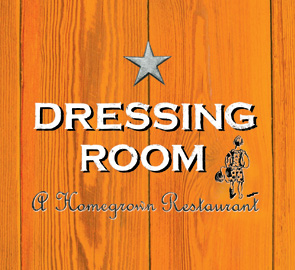
At this point we did in fact sit down and Michel wowed us with a walk through his menu. The Chicken & Dumplings were out of this world. Simple, fresh and relying on the natural flavors of the free range organic chicken. Michel calls these Heritage Recipes and we agree that the simplicity and purity of the product and presentation are quite apparent and delicious. The meatloaf was to die for and the ribs were every bit as lip smacking good as he told us. We hope that you have enjoyed reading this as much as we did in sitting to do the interview.
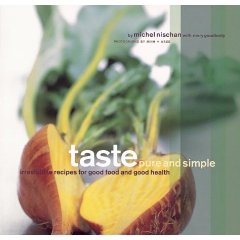 We hope that you will find more ways to buy organic and support your local growers. You can get these and other recipes in Michel's cookbook, taste pure and simple.
We hope that you will find more ways to buy organic and support your local growers. You can get these and other recipes in Michel's cookbook, taste pure and simple.
Go to his website: http://www.michelnischan.com/cookbook.htm for more details on how to get your copy. 
To find out more about wholesome wave just click on the logo.
The Meatloaf Recipe
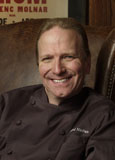 Dressing Room Meatloaf, Michel Nischan
Dressing Room Meatloaf, Michel Nischan
Ingredients
2 to 3 tablespoons olive oil
Kosher salt and freshly ground black pepper
1 cup peeled, diced parsnip (4 ounces; 2 to 4 parsnips)
3/4 cup peeled, diced carrots (3 ounces; about 2 carrots)
1/2 cup peeled, diced celery root (2 ounces)
1/3 cup diced onion (1-1/2 ounces)
3 pounds ground beef
Season
2 cups soft, fresh bread crumbs (about 4 slices of quality bread)
1 cup whole milk
2 large eggs
1/3 cup ketchup (3 ounces)
1 tablespoon kosher salt
1/4 teaspoon freshly ground black pepper
Method
1. Preheat the oven to 375 degrees F.
2. In a large sauté pan, heat the oil over medium-high heat. When hot, sauté the parsnips, carrots, celery root, and onions with a pinch of salt and pepper for 6 to 8 minutes or until softened. Set aside for 10 to 15 minutes to cool slightly.
3. In a large mixing bowl, mix together the bread crumbs, milk, eggs, ketchup, salt, and pepper. Add the meat and cooked vegetables and using a wooden spoon or your hands, mix well.
4. Transfer the meat to a baking dish that measures 8- or 9-inches square or round
5. Bake for about 1-1/2 hours or until the meat loaf is heated all the way through. An instant-read thermometer inserted in the center of the loaf will read 145 degrees F.
6. Serve the meatloaf from the pan. Slice into serving pieces about 1 inch thick.



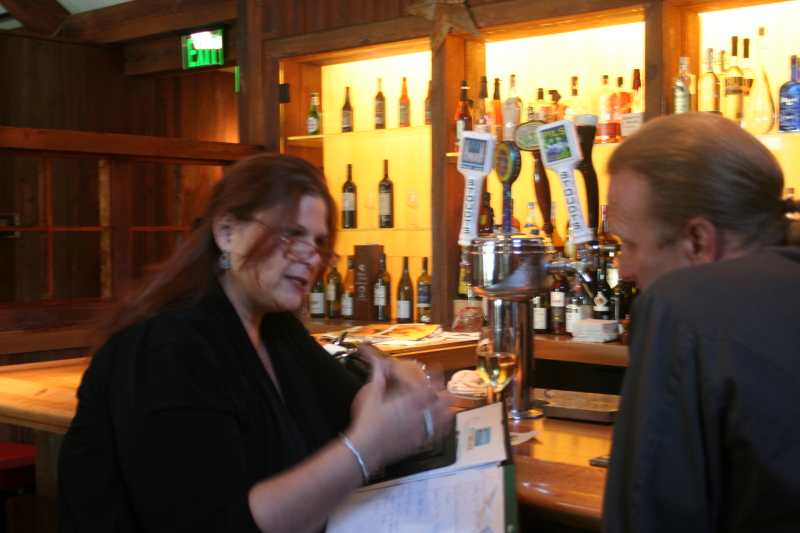
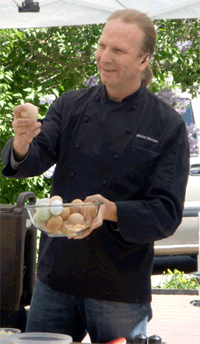 Elaine: Give us an update on how the Wholesome Wave Project is addressing this issue.
Elaine: Give us an update on how the Wholesome Wave Project is addressing this issue.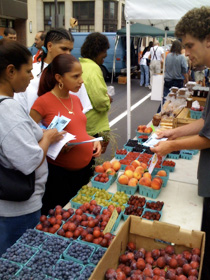 Michel: I have pictures of young pregnant women buying produce at the farmers market for the first time. They had never shopped there before, but because of this program they can redeem food stamps and provide healthy fresh food for their family.
Michel: I have pictures of young pregnant women buying produce at the farmers market for the first time. They had never shopped there before, but because of this program they can redeem food stamps and provide healthy fresh food for their family. We negotiate buying food from the farmers at the end of the day for half price, getting the wholesale deal. We then pack boxes and bring them to soup kitchens, opening them as a farm stand. Allowing people to come and get double value for their food stamps.
We negotiate buying food from the farmers at the end of the day for half price, getting the wholesale deal. We then pack boxes and bring them to soup kitchens, opening them as a farm stand. Allowing people to come and get double value for their food stamps. A person/family knows they can’t buy all their groceries organic, so they begin by buying just apples. When they feel good about that change, and they know they would like more, all of sudden they get creative with their budgets and ideas pop up. A family starts with one change because they are on a tight budget and realize that maybe some of the things they thought were important for their family aren’t as important as buying healthy food. That can also be said for municipalities and what they are providing for their residents.
A person/family knows they can’t buy all their groceries organic, so they begin by buying just apples. When they feel good about that change, and they know they would like more, all of sudden they get creative with their budgets and ideas pop up. A family starts with one change because they are on a tight budget and realize that maybe some of the things they thought were important for their family aren’t as important as buying healthy food. That can also be said for municipalities and what they are providing for their residents. 